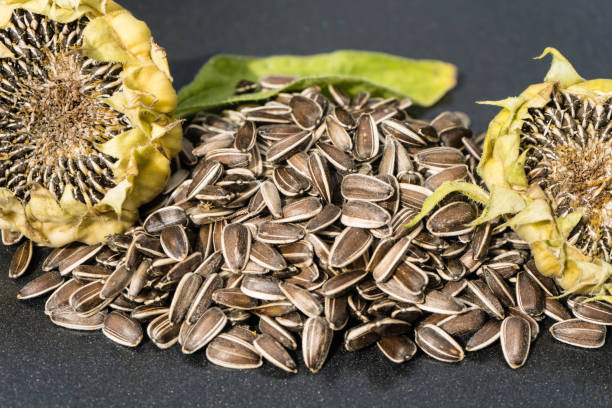Sunflower Seeds (Sunflower Kernels)
Sunflower seeds are the edible seeds of the sunflower plant (Helianthus annuus). The dehulled (hulled) version is called sunflower kernels. They are widely consumed as a snack and used in food production due to their nutritional richness and mild nutty flavor.
Physical Characteristics
Color: Light grey to white or pale yellow (hulled)
Shape: Oval and slightly elongated
Size: Approx. 0.8–1.2 cm in lengt
Texture: Smooth and firm
Flavor: Nutty, slightly sweet when roasted
Chemical Properties
Moisture Content: Max. 7%
Protein: 20–25%
Fat: 45–55% (rich in polyunsaturated fats
Carbohydrates: 15–20%
Crude Fiber: 5–8%
Ash Content: Approx. 3–4%
Nutritional Information (Per 100g)
Calories: ~580 kcal
Protein: ~21g
Fat: ~51g
Carbohydrates: ~20g
Fiber: ~8g
Rich in: Vitamin E, Selenium, Magnesium, Phosphorus, B Vitamins
Quality Standards
“Compliant with local and European standards according to food safety regulations.”
Uniform color and size
Free from shells, foreign matter, mold, and pests
No rancid odor or off-flavor
Non-GMO, and meets standards such as ISO, HACCP, or Codex Alimentarius
Microbiological Standards
Total Plate Count: <10⁴ CFU/g
Yeasts & Molds: <10² CFU/g
Coliforms: <10 CFU/g
E. coli: Absent
Salmonella: Absent in 25g sample
Packaging and Storage
As per the customer’s request, polypropylene bags and cartons.”
Storage: Store in a cool, dry, well-ventilated place, away from direct sunlight and moisture
Ideal Temperature: 10–20°C
Humidity: Below 60%
Shelf Life
12 months under recommended storage conditions
Origin :Egypt
APPLICATION
Consumed raw or roasted as a healthy snack
Added to salads, trail mixes, and granola
Used in bakery products (bread, crackers, cookies)
Incorporated in nut butters and protein bars
Used in health foods and vegan cheese production
Source of oil extraction for cooking and cosmetics
Contact information:

